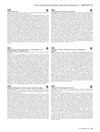 April 2017 in “Journal of Investigative Dermatology”
April 2017 in “Journal of Investigative Dermatology” Most patients with cutaneous dermatomyositis either improved or remained stable over 3.5 years.
 November 2016 in “Elsevier eBooks”
November 2016 in “Elsevier eBooks” Genetic mutations can affect female sexual development, requiring personalized medical care.
 August 2015 in “Postgraduate obstetrics & gynecology”
August 2015 in “Postgraduate obstetrics & gynecology” Women with PCOS often have metabolic issues like insulin resistance and a higher risk of diabetes and abnormal lipid levels.
[object Object]  August 2015 in “Postgraduate obstetrics & gynecology”
August 2015 in “Postgraduate obstetrics & gynecology” Women with PCOS often have insulin resistance, abnormal lipid levels, and a higher risk of diabetes and heart disease; lifestyle changes and medication like metformin can help manage these risks.
 March 2014 in “Human Physiology”
March 2014 in “Human Physiology” DHEA improved brain function and behavior in old monkeys and had additional health benefits.
 March 2012 in “Journal of The American Academy of Dermatology”
March 2012 in “Journal of The American Academy of Dermatology”  November 2010 in “Value in Health”
November 2010 in “Value in Health” Treating chronic hand eczema costs about the same in statutory and occupational health insurances in Germany, but work-related cases may lead to higher indirect costs due to longer work absences.

The document concludes that Syndromes of Severe Insulin Resistance are rare disorders with limited treatment options.
 July 2003 in “Journal of Cutaneous Medicine and Surgery”
July 2003 in “Journal of Cutaneous Medicine and Surgery” Treating psoriasis with UVB light three times a week is faster than twice a week, and certain medications and lifestyle factors affect psoriasis treatment outcomes.
 April 2021 in “Journal of Investigative Dermatology”
April 2021 in “Journal of Investigative Dermatology” Spironolactone safely and effectively treats hair loss in female scarring alopecia patients.
 1707 citations,
December 2003 in “The New England Journal of Medicine”
1707 citations,
December 2003 in “The New England Journal of Medicine” Combination therapy of doxazosin and finasteride safely and effectively reduces benign prostatic hyperplasia progression risk.
 1054 citations,
February 1998 in “The New England Journal of Medicine”
1054 citations,
February 1998 in “The New England Journal of Medicine” Finasteride reduces urinary issues and surgery need in men with enlarged prostates by over 50%.
 467 citations,
October 2014 in “European Journal of Endocrinology”
467 citations,
October 2014 in “European Journal of Endocrinology” The European Society of Endocrinology advises individualized long-term management for PCOS, focusing on lifestyle changes, accurate diagnosis, and treatments for associated health risks and symptoms.
 363 citations,
May 2006 in “Current Opinion in Psychiatry”
363 citations,
May 2006 in “Current Opinion in Psychiatry” Anorexia and bulimia lead to serious health problems and increased risk of death, requiring aggressive treatment.
 286 citations,
January 2009 in “Human Reproduction Update”
286 citations,
January 2009 in “Human Reproduction Update” Women with the NIH type of PCOS have more obesity and higher risk of diabetes and heart disease than those with other types of PCOS.
 221 citations,
January 2014 in “Human Reproduction”
221 citations,
January 2014 in “Human Reproduction” Adding anti-Müllerian hormone to PCOS criteria lowers the number of women diagnosed.
 176 citations,
June 2017 in “Sexual Medicine Reviews”
176 citations,
June 2017 in “Sexual Medicine Reviews” Erectile dysfunction is increasingly common in men under 40, with many physical and psychological causes, and various treatment options available.
 110 citations,
April 2002 in “The Journal of clinical endocrinology and metabolism/Journal of clinical endocrinology & metabolism”
110 citations,
April 2002 in “The Journal of clinical endocrinology and metabolism/Journal of clinical endocrinology & metabolism” Dihydrotestosterone gel improved well-being and sexual function in older men without negatively affecting prostate health.
 108 citations,
November 2006 in “The Milbank Quarterly”
108 citations,
November 2006 in “The Milbank Quarterly” Drug advertising has greatly increased, changing consumer behavior and raising concerns about its influence on healthcare and patient protection.
 70 citations,
October 2020 in “The journal of allergy and clinical immunology/Journal of allergy and clinical immunology/The journal of allergy and clinical immunology”
70 citations,
October 2020 in “The journal of allergy and clinical immunology/Journal of allergy and clinical immunology/The journal of allergy and clinical immunology” Janus kinase inhibitors are promising drugs for treating autoimmune and inflammatory diseases.
 68 citations,
September 2003 in “British Journal of Dermatology”
68 citations,
September 2003 in “British Journal of Dermatology” Shrinking skin cancer increases the chance of cancer in nearby lymph nodes.
 67 citations,
February 2010 in “Acta Obstetricia et Gynecologica Scandinavica”
67 citations,
February 2010 in “Acta Obstetricia et Gynecologica Scandinavica” Hirsutism is a strong sign of high male hormones and metabolic problems in women with PCOS, but acne and hair loss are not.
 63 citations,
May 2017 in “American Journal of Clinical Dermatology”
63 citations,
May 2017 in “American Journal of Clinical Dermatology” People with alopecia areata often have lower levels of vitamin D, zinc, and folate, but more research is needed to understand if supplements can help treat it.
 62 citations,
July 2017 in “Endocrine connections”
62 citations,
July 2017 in “Endocrine connections” Adults with polycystic ovary syndrome are much more likely to have obstructive sleep apnea.
 52 citations,
May 2013 in “Supportive Care in Cancer”
52 citations,
May 2013 in “Supportive Care in Cancer” Scalp cooling significantly reduces hair loss in chemotherapy patients.
 45 citations,
December 2018 in “Lasers in Medical Science”
45 citations,
December 2018 in “Lasers in Medical Science” LLLT promotes hair growth and improves hair density safely in men and women.
 43 citations,
July 2020 in “Dermatologic Therapy”
43 citations,
July 2020 in “Dermatologic Therapy” During the COVID-19 pandemic, a clinic in Turkey saw fewer patients but more cases of certain skin conditions, possibly linked to the virus and stress.
[object Object]  40 citations,
August 2022 in “Frontiers in immunology”
40 citations,
August 2022 in “Frontiers in immunology” Blocking JAK/STAT pathways can help treat hair loss from alopecia areata.
 39 citations,
October 2018 in “Aesthetic surgery journal”
39 citations,
October 2018 in “Aesthetic surgery journal” Injectables can feminize or masculinize a transgender person's face, but more research is needed for best practices.
 38 citations,
November 2012 in “Expert Opinion on Drug Safety”
38 citations,
November 2012 in “Expert Opinion on Drug Safety” Common acne treatments can cause various side effects, like skin irritation and more serious issues, but combination therapies are often more effective and better tolerated.






























